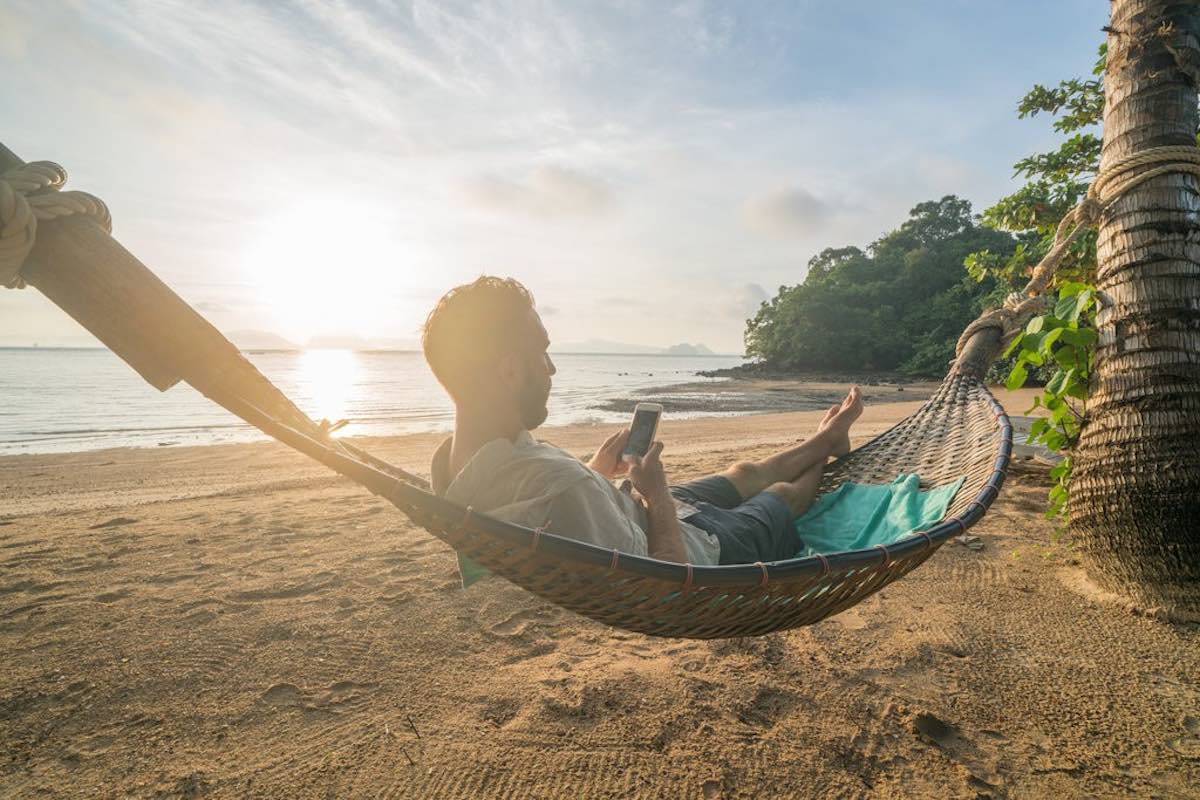How Not to Let Your Phone Ruin Your Vacation

Strategies for traveling without letting your phone keep you from enjoying your trip.
Now that summer is in full swing, a lot of people have been asking me the same question: How can you take your phone with you on vacation without letting your phone ruin your vacation?
It’s a modern quandary: Phones are obviously useful tools, especially when you’re on the road. But too often, a quick check turns into an hourlong scroll session. And if you’re going to spend your trip trolling Instagram or responding to emails, what’s the point of leaving home?
It might seem absurd to have to strategize how to set boundaries with your smartphone. But the reward — a vacation that feels like a vacation — is well worth the work. Here are some useful tips on how to use your phone on vacation, without letting it hijack your trip.
Before You Leave: Prepare Yourself
Define your goal. Ask yourself — and your companions — what’s the point of the trip? To relax? To experience new things? To spend time together? To escape your routine? In other words, what do you actually want to spend your time doing? (I’m willing to bet that you won’t say “obsessively checking my work email.”) Write down your goal, take a photo of it, and set it as your lock screen image (or use one of these) so that you’re reminded of it when you instinctively reach for your phone.
Identify what you want to use your phone for. To take photos? Navigate? Check in with the office? Knowing what you want to use your phone for makes it easier to catch yourself when you’re using your phone for something that’s not on your list.
Don’t fall for your brain’s tricks. It is likely that your brain is going to concoct all sorts of “reasons” you have to check, or scroll, or post while you’re on vacation. That’s because checking our phones triggers the release of dopamine, a neurotransmitter that encourages us to repeat behaviors that our brains have judged to be rewarding (it’s no coincidence that dopamine plays a major role in addictions). What’s more, not checking your phone can cause your body to release stress hormones such as cortisol — a double whammy. So whenever you feel yourself reaching for your phone because you “need” to do something, ask yourself whether it’s an actual need — or if it’s an excuse.
Every time you find yourself about to check your phone on vacation, ask yourself: What is the best thing that could be waiting for you? At the very least, checking your phone will distract you. And if you find bad news waiting for you, it can ruin your day.
Remember: when you “check in,” you check out. Mentally and physically, we can’t be two places at once. So every time you turn your attention to your phone, you are turning your attention away from everything else.
Before You Leave: Prepare Your Phone
Delete your “problem apps”— that is, the ones that often leave you wondering what happened to the last 45 minutes of your life. The most likely culprits are social media, email, dating, games, shopping and the news, all of which offer novelty, unpredictability and the potential for a reward — just like slot machines. (If your phone won’t let you delete them, hide them in a folder off your home screen.)
You can always check these platforms through your phone’s internet browser if you must, and you can reinstall them at any time — but why not use your vacation as a chance to see what life is like without Facebook?
Create a temptation-free home screen. Rearrange your apps so that your home screen contains only practical apps that won’t suck you in (for example, the camera, maps or a translation app). Those are your “tools,” and you can use them freely.
Put your other apps into folders on an interior page to prevent yourself from being tempted by their icons.
Turn off all notifications, except for the ones you actually want to receive while you’re on vacation. (I particularly recommend disabling the news.) Note: those little red circles that pop up on apps’ icons are also notifications, called “badges.” Turn those off, too — including for email.
Reduce FOMO (the fear of missing out) by setting up vacation auto-responses for your email, voice mail and text messages. (To set up an automatic text message response on iPhones, use the customized option for “Do Not Disturb While Driving”; for Android, download a third-party app such as Lilspace.) Update your status on social media accounts so that your friends and followers know that you’re away. Then shed a tear for the fact that this is a cause of anxiety to begin with. To read more from Catherine Price, click here.
